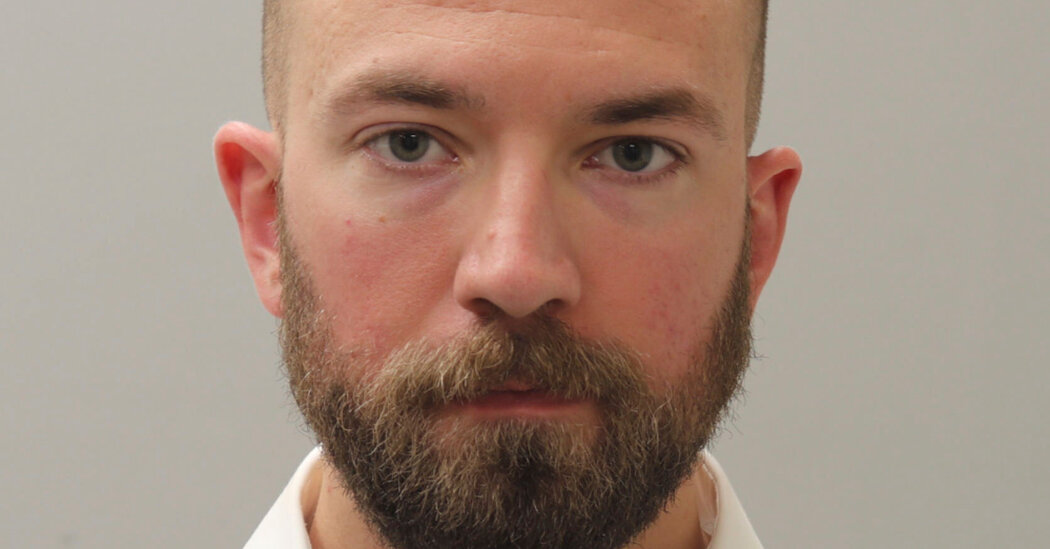Jeffrey Parker had called 911 to report that he was suicidal and was holding a gun to his head when he was fatally shot by Officer William Darby, prosecutors said.
A police officer in Huntsville, Ala., was convicted of murder on Friday for fatally shooting a man who had called 911 to report that he was suicidal and who was holding a gun to his head when the police arrived, prosecutors said.
The officer, William Darby, who had been strongly defended by the Police Department and cleared of wrongdoing by a city review board, will face 20 years to life in prison when he is sentenced for the killing of Jeffrey Parker, 49, on April 3, 2018, according to prosecutors.
The verdict stunned city leaders, who had maintained that Officer Darby was justified in using deadly force. The Huntsville City Council had voted to dedicate $125,000 in public money for the officer’s criminal defense, according to AL.com. And police officers throughout Alabama had been watching the case because of how frequently they respond to mental health crises.
“We are in the first stages of shock,” the Huntsville police chief, Mark McMurray, said in a statement. “While we thank the jury for their service in this difficult case, I do not believe Officer Darby is a murderer. Officers are forced to make split-second decisions every day, and Officer Darby believed his life and the lives of other officers were in danger.”
Prosecutors said the evidence showed that the first officer on the scene, Genisha Pegues, had been trying to help Mr. Parker when Officer Darby showed up. Officer Darby, who was 25 and had been on the force for about 18 months, shot Mr. Parker 11 seconds after entering his house, according to Martin Weinberg, a lawyer who represents Mr. Parker’s family.
“In this particular case, there was zero hostility or aggression by Mr. Parker when the officers arrived,” the Madison County district attorney, Robert L. Broussard, said at a news conference. Yet Officer Darby’s response was “off the charts,” he said.
“The facts of the case bore out that there was nothing justified about this encounter with Mr. Parker, and justice was served,” Mr. Broussard said.
Officers called to Mr. Parker’s house found him “suicidal” and holding a gun, the police said in a statement in August 2018. After Mr. Parker disregarded several orders to drop his weapon, Officer Darby fatally shot him, the police said.
According to a lawsuit filed by Mr. Parker’s family, Officer Darby was the third officer to arrive at Mr. Parker’s house that day.
Officer Pegues had entered with her gun pointed down and found Mr. Parker sitting on a couch with a gun to his head, according to the lawsuit. She had been talking to him when Officer Darby arrived about five minutes later, according to the lawsuit.
Officer Darby began screaming at Officer Pegues while he was still in the front yard, according to the lawsuit, telling her to point her gun at Mr. Parker because “he can shoot you!” Officer Darby then repeatedly yelled at Mr. Parker to put his gun down before firing a single shot that killed Mr. Parker, the lawsuit states.
About a month later, a review board convened by the Huntsville Police Department concluded that Officer Darby’s use of deadly force had been “within policy,” the city said.
But a Madison County grand jury indicted the officer in August 2018.
At Officer Darby’s trial, Officer Pegues testified that she had never felt that Mr. Parker was a threat, and a prosecutor argued that Officer Darby had been the initial aggressor, according to WSFA, a local television station.
Officer Darby’s lawyer, Robert Tuten, contended that Officer Darby had not been the initial aggressor and had been protecting not only himself but his fellow officers, WFSA reported. After the verdict on Friday, Mr. Tuten vowed to appeal.
“To say that people are shocked by this verdict would be a big understatement,” Mr. Tuten said at a news conference. “This was a very important case to Alabama law enforcement,” he added, and could affect the way officers throughout the state respond to people with guns and threats of suicide.
“Everybody has been watching this,” Mr. Tuten said.
Mayor Tommy Battle said that he disagreed with the verdict and that Officer Darby had the right to appeal. “Officer Darby followed the appropriate safety protocols in his response on the scene,” he said in a statement. “He was doing what he was trained to do in the line of duty.”
Bill Parks, a longtime friend of Mr. Parker’s, said he hoped that the conviction would prompt officers to respond more humanely to people in mental health crises.
At a news conference on Friday, Mr. Parks said his friend had been “a very kind soul” who had loved music and “could fix anything” but who had also had his “demons.”
“He just asked for help,” Mr. Parks said. “He wanted help, and what ended up in a situation where he asked for help turned out terribly.”



















